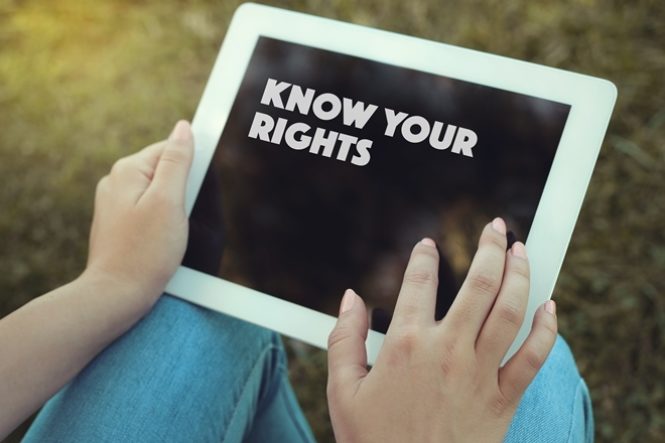
Your Rights
- You have the right to talk to a lawyer if you are arrested or detained by the police.
- You do not have to tell the police anything but your name.
- You have a right to a fair trial.
- Your trial must be held within a reasonable amount of time.
Right to a Lawyer
If you have been detained or arrested by the police, you have the right to a lawyer. This means that you must be…
- told promptly that you have a right to a lawyer
- told that you have the right to call duty counsel to get free initial legal advice over the telephone
- told about Legal Aid for people who cannot afford a lawyer
- given a reasonable chance to get a lawyer (the police cannot limit you to one phone call if you are trying to call a lawyer)
- allowed to speak to a lawyer, in private, as soon as possible if you ask to do so
For some serious offences, the police can photograph and fingerprint you before your lawyer gets to the police station.
Right to Remain Silent
If you have been detained, arrested or charged with a crime you must be told that you have the right to remain silent. This means that...
- you must give the police your name
- you do not have to answer any more questions
- you do not have to give the police any kind of a statement, in writing or otherwise
The police can and will ask you questions but you do not need to answer. If you do say anything at any time it can be used against you in court.
It is very important to talk to a lawyer before saying anything to the police. Make sure to tell the police you want to talk to a lawyer. Then wait to speak with a lawyer before deciding to say anything else. It is your right.
If you go to court because of criminal charges, you do not have to testify. The Judge or Jury cannot consider the fact that you choose not to testify as evidence that you are guilty.
Right to a Fair Trial within a Reasonable Time
When you go to court you are presumed to be innocent. It is up to the government, represented by a Crown Prosecutor, to prove you committed the crime. This must be proven beyond a reasonable doubt. This means that the Judge or Jury must conclude that the only sensible explanation for the evidence is that you committed the crime.
If you do not admit the crime, you have the right to a fair trial within a reasonable time. Evidence that was obtained during an improper search can be excluded.
Language Rights
If you are going to trial you have the right to an interpreter. You can ask for an interpreter if you do not understand English or cannot speak English well enough to communicate to others. An interpreter will be provided and paid for by the court.

